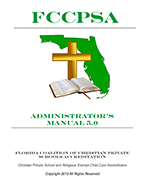K-12 Administrator's Manual
Since 1991 FCCPSA has worked to equip Christian private school administrators with the tools and resources they needed to professionally run their respective schools. Our hope is that this manual will serve as a resource of information to help you navigate through the obstacles of establishing and operating a private school. This manual is provided as a standard to ensure excellence and credibility to your school as it operates and grows as a Christian educational organization.
The FCCPSA 6.0 Administrators Manual is a required resource for K-12 schools seeking FCCPSA accreditation.
The log in page for the laterst version of the K-12 Administrators Manual is here.
Class.FCCPSA.org
Section 1: Introduction 
Beginning with the purpose of this manual, the Vision, Mission, and Philosophy of the FCCPSA, detailing some Benefits of FCCPSA Membership and the organizations we have partnered with to better support your school ministry. The introduction section lets you know who the FCCPSA is and how we can work together to support your school.
Section 2: Compliance Safety
It is the governing authority's responsibility to comply with all required laws, keep students and staff safe by developing a system of supervision and administration under which the school will operate. Many of those duties will be delegated to the school administrator or principal. Therefore, both entities are highlighted as having responsibility for the topics in this section.
These are the regulatory compliance options or the steps required to open a private school, specifically in Florida.
Section 3: Administration
As we move to the day-to-day operation of the school, most of the topics detailed in the administrative section will be supervised by the school administrator or principal. However, the governing authority has the ultimate responsibility to ensure that the system of supervision is consistent with the policies and procedures developed by or approved by the governing authority.
Private schools are free from many but not all requirements of state-run schools. This means many of the day-to-day operations will look much different than their public-school counterpart. It is not the purpose of this manual or FCCPSA to dictate how each school should be run except where required by law or accreditation. Instead, it contains options, suggestions, samples, and standard procedures that will guide you in developing your policies and procedures for effective day-to-day administration based on the vision and mission.
Section 4: Elementary and Middle School
Covering topics specific to the effective administration of younger students.
Section 5: High School
From diploma options to graduation and post-high school opportunities, this section of the manual covers a wide variety of topics on operating a high school.
A personal Story
In 1994, three families in Lakeland, Florida felt the Lord was leading them to start a private school to work with families and meet a need in their local community. The process consumed much prayer for wisdom and not a little knocking on doors, with generous amounts of calling complete strangers on the phone seeking advice, options, and concrete direction.
(For those younger than fifty, I must remind you that what we know as the“Internet” today was not open to the general public until 1995. The people (some would say geeks) who owned a “personal computer” were few and far between. I’m not sure how we survived without cell phones, laptops, or an iPad, but the Lord is gracious.)
The search led two of those families to drive to Orlando to meet with Rev. John Heaton (a board member of the FCCPSA), who had a used copy of something he called the “Administrator’s Manual.” It was almost six inches thick; some of the pages were loose or missing. The pages that were intact were, for the most part, copies of forms, statutes, and other documents that had been grouped by sections in a three-ring binder.
That manual did not look that impressive, but what it contained changed our lives forever. The step-by-step guidance on what was required to become incorporated, including sample Articles of Incorporation and By-Laws, obtaining a school code number from the Florida Department of Education, and a hundred other items and requirements that we did not even know to ask about gave us the confidence that, with the Lord’s help, we could do this.
That manual was written twenty-five years ago, and, through it and the revised editions that have followed, hundreds of Christian private schools have been formed in Florida. New administrators have learned of the specific requirements that their job entails. Ultimately and most importantly, thousands of parents have had better choices for the education of their children. For me, the “Administrator’s Manual” defines the FCCPSA. Our mission is to train and equip Christian private school administrators for the betterment of students.
The new manual builds on the work of those visionaries of the past. However, it is not the bulky “copies of copies” of old. The FCCPSA Administrator’s Manual 5.0 has been rebuilt from the ground up. New sections have been created, new innovations in education are referenced, and hundreds of resources have been added. This is knowledge at your fingertips, with links to additional sites, and a resource CD that contains samples and forms you can use as needed for your ministry.
Our heartfelt thanks and appreciation to Liz Darnel and Kristen Ross who have spent many hours in this labor of love and have, once again, provided school administrators with not just a good manual, but with a must-have administrative tool.




